The Independent's journalism is supported by our readers. When you purchase through links on our site, we may earn commission.
How to spend a day in Jaffa, Tel Aviv’s historic port neighbourhood
From Palestinian street eats to next-gen galleries and centuries-old relics, Jaffa delivers an enthralling pick-and-mix of highlights, says Chris Schalkx
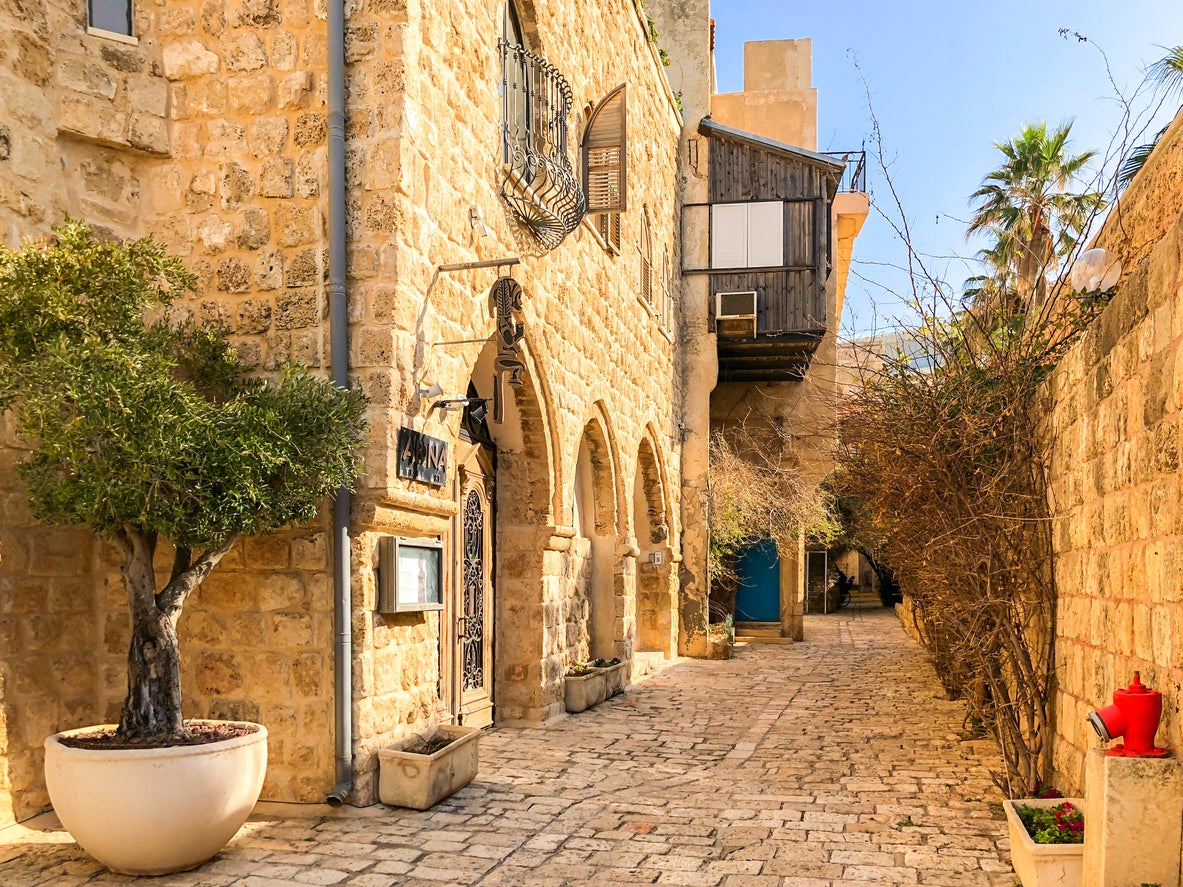
Your support helps us to tell the story
This election is still a dead heat, according to most polls. In a fight with such wafer-thin margins, we need reporters on the ground talking to the people Trump and Harris are courting. Your support allows us to keep sending journalists to the story.
The Independent is trusted by 27 million Americans from across the entire political spectrum every month. Unlike many other quality news outlets, we choose not to lock you out of our reporting and analysis with paywalls. But quality journalism must still be paid for.
Help us keep bring these critical stories to light. Your support makes all the difference.
Our microguides series is inspired by the slow travel movement, encouraging travellers to relax their pace and take a deep dive into one particular neighbourhood in a well-loved city. Rather than a whirlwind itinerary which aims to hit up every must-see attraction, these compact, close-up guides encourage you to zone in, take your time and truly explore like a local.
Long before Tel Aviv even existed, there was Jaffa. This port town, found just south of Israel’s high-octane second city, is so ancient that it’s mentioned in the New Testament and Egyptian literature from 1440BC. Even Jonah, the prophet who got swallowed by a whale, is said to have started his near-fatal voyage from here.
Over time, many of Jaffa’s residents and businesses moved north, following the expansion of – and annexation by – modern, metropolitan Tel Aviv, leaving Jaffa’s crumbling streets ripe for gentrification. Artists’ studios took over century-old homes and Ottoman-era factory buildings, while hip restaurants and five-star hotels sprang up in ornate and atmospheric surroundings.
Today, Jaffa is a hotbed for Israeli and Arab creativity and one of Israel’s few “mixed cities”, where Arabs make up about 37 per cent of the residents. The port is a short taxi-hop or 3km stroll from downtown Tel Aviv, making it a popular area for a half-day trip from the city.
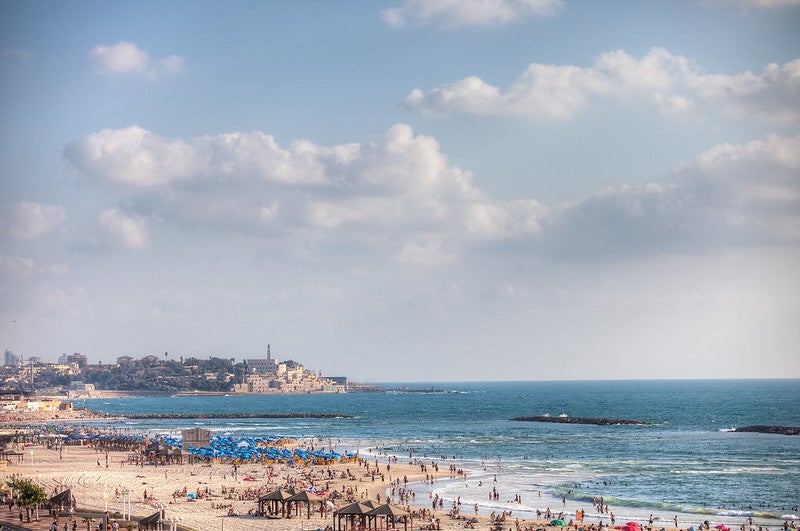
Do
Stroll around Old Jaffa
A walk through the higgledy-piggledy alleys of Old Jaffa, a labyrinthine jumble of limestone steps and arched gateways, feels like a time machine to the Jaffa of centuries ago. Enter through the well-marked staircase from Jaffa Port’s corniche to weave through the cobblestoned lanes, where jewellery ateliers, art galleries and tearooms have popped up over the past few years. History buffs shouldn’t skip the palm-fringed St Peter’s Church, initially built in 1654 and rebuilt in the late 19th century. Come sunset, head up to the hilltop in Abrasha Park for fabulous views over the Mediterranean, and Tel Aviv’s shimmering skyline.
Join a culinary tour
For a deep dive into the cultures that shape modern-day Jaffa, a food and walking tour around the district is the way to go. Delicious Israel’s guides will take you through its culinary highlights at a leisurely pace, teaching you everything there is to know about Turkish-inspired malabi pudding, cheesy Palestinian knafeh desserts, and the right way to “swipe” a mouthful of Abu Hassan’s legendary hummus (with raw onion wedges – it’s a thing). Each dish is served with a side of history, as your crawl continues through adjoining Neve Tzedek (Jaffa’s first suburb) and into the dizzying Carmel Market.
Hit the beach
Jaffa’s closest stretch of sand starts just north of its corniche, a five-minute walk from the heart of the Old Town. It’s a lovely, low-key affair compared with the parasol-studded beaches further down the coast; the lively waves make this a great spot for surfing, while in the summer months surf instructors rent out SUPs and surfboards from their trucks in the car park.
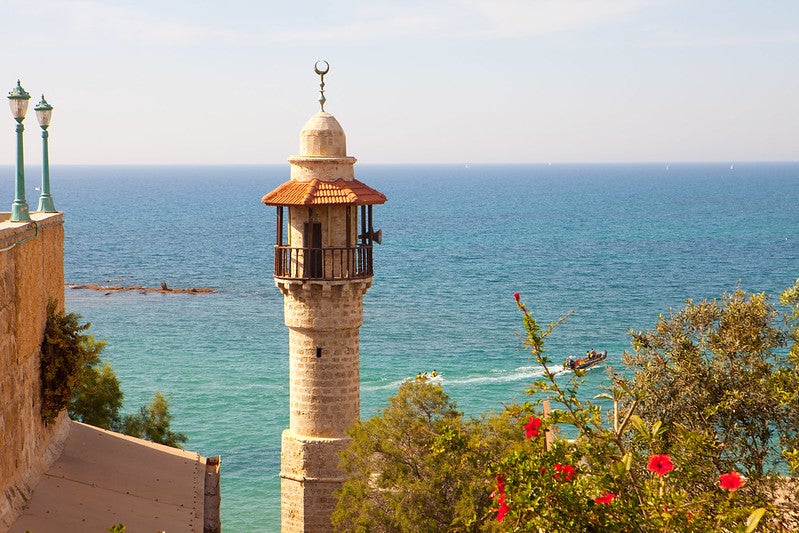
Eat
Ramesses
When the sun sets, the fairy lights strung between the graffiti-scrawled warehouses in Jaffa’s revived Greek Market flick on, and Ramesses’ kerbside tables fill up with hip locals and clued-up visitors. You’ll find them sharing Israel-meets-India-inspired bites (grilled octopus, tikka masala salmon skewers) and sipping on cocktails with experimental flavours such as olive-infused gin, Sri Lankan tea or lavender.
Beit Kandinof
The owners of Beit Kandinof took a meticulously renovated Ottoman-era building, with crumbling walls and a soaring cavernous ceiling, and turned it into one of Jaffa’s most sought-after restaurants. Part art gallery, part atelier and part restaurant, its menu fuses Israeli classics with global flavours – think lamb pancetta burgers, breaded red mullet with labneh and drum fish fillet with Thai red curry.
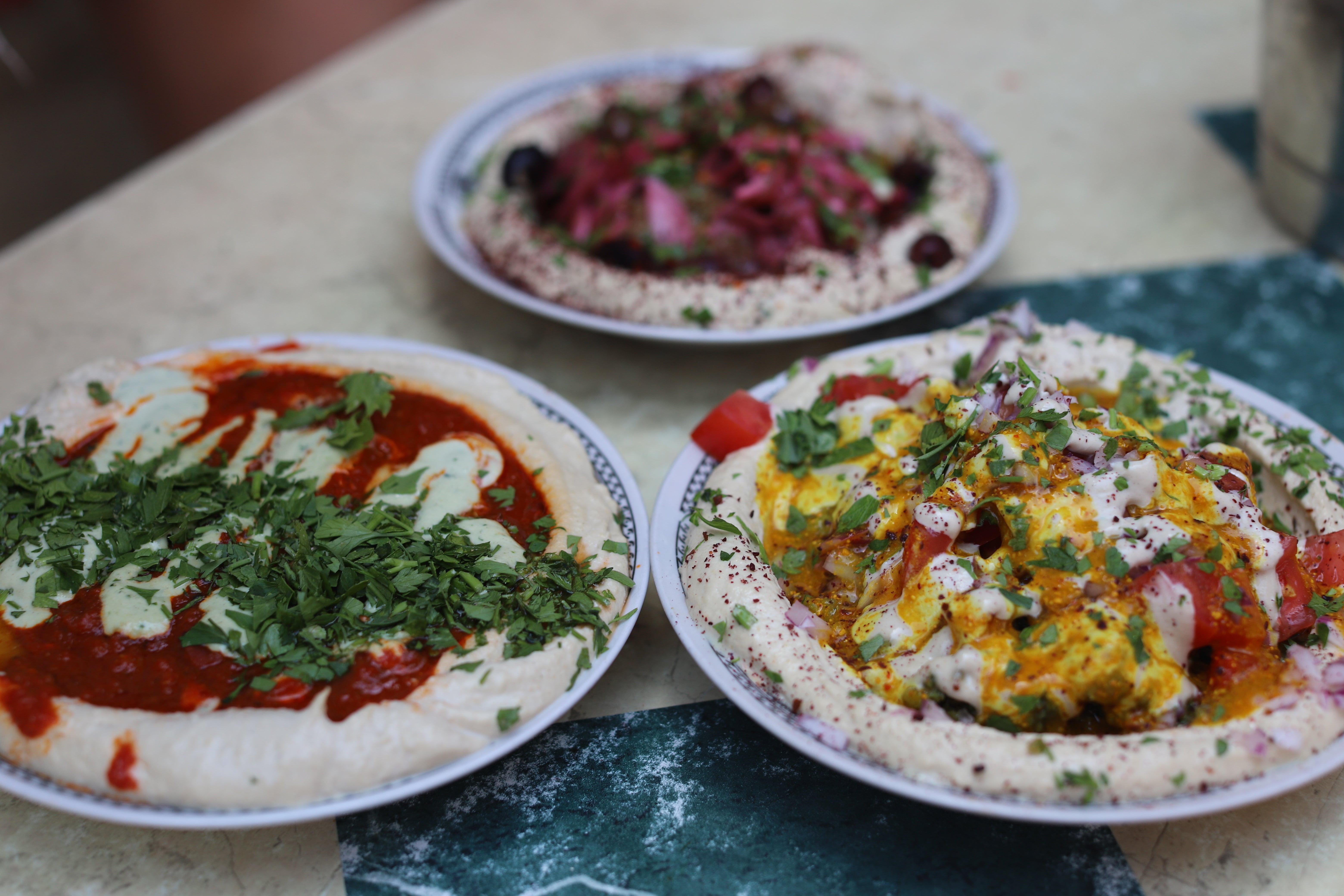
Drink
BeerBazaar
The Jaffa Flea Market outpost of BeerBazaar – an Israeli gastropub chain with locations in Tel Aviv and Jerusalem – is an excellent pitstop for a cold pint. On the blackboard behind the bar, you’ll find a rotating list of beers on tap, brewed in-house or locally, while the adjoining shop sells more than 100 lagers, IPAs and Triple Hops brewed and bottled around Israel.
Cafelix
Jaffa isn’t as café-packed as the neighbourhoods you’ll wander in Tel Aviv, so you’ll have to venture outside its touristy centre if you’re after a proper coffee. Opened by a couple of German-Israeli bean aficionados, the Jaffa branch of Cafelix pours top-notch espressos, nitro-brews and cappuccinos made from beans that are house-roasted and ethically sourced from Ethiopia to Brazil.
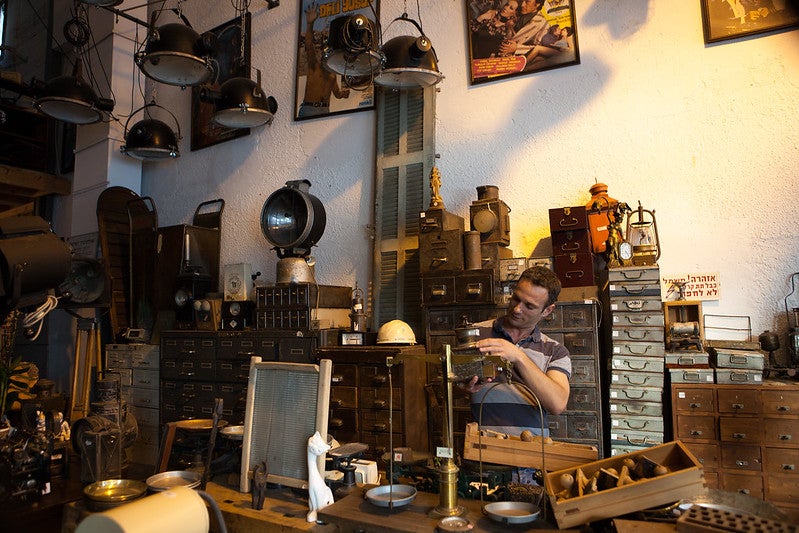
Shop
Hilweh Market
At this pint-sized boutique on Yefet Street, social-policymaker-turned-shop-owner Adrieh Abou Shehadeh uses design and crafting as a tool to reclaim space for Jaffa’s dwindling Palestinian community. You’ll find both contemporary designs and age-old crafts from Palestinian and Arab makers – keep an eye out for the olive-wood serving trays from a family-run workshop in Bethlehem, tactile ceramics from Jaffa-based Palestinian ceramicist Nur Minawi, and gorgeous cobalt blue pitchers made from recycled glass in Hebron.
The Jaffa Flea Market (Shuk Hapishpeshim)
The streets just south of Jaffa’s hard-to-miss clock tower are packed with vendors hawking secondhand goods, which run the gamut from timeworn junk to real treasures. You’ll have to dig around to find intricately decorated silver spoons, kaleidoscopic Persian rugs, and colourful vintage tea tins, but the homeware boutiques and concept stores that moved into the area over the past few years make shopping for souvenirs a breeze.
SAGA
SAGA, a sleek gallery and concept store on the Flea Market’s perimeter, puts the spotlight on both established and emerging design talent from around Israel. Eye-catchers include ceramic pendant lights by Tel Aviv-based Noa Razer, and stools from woven velvet rope by Knots Studio. Even Judaica gets a high-design treatment here, with Passover Seder plates made from confetti-speckled terrazzo and candlesticks in bright, zingy colours.
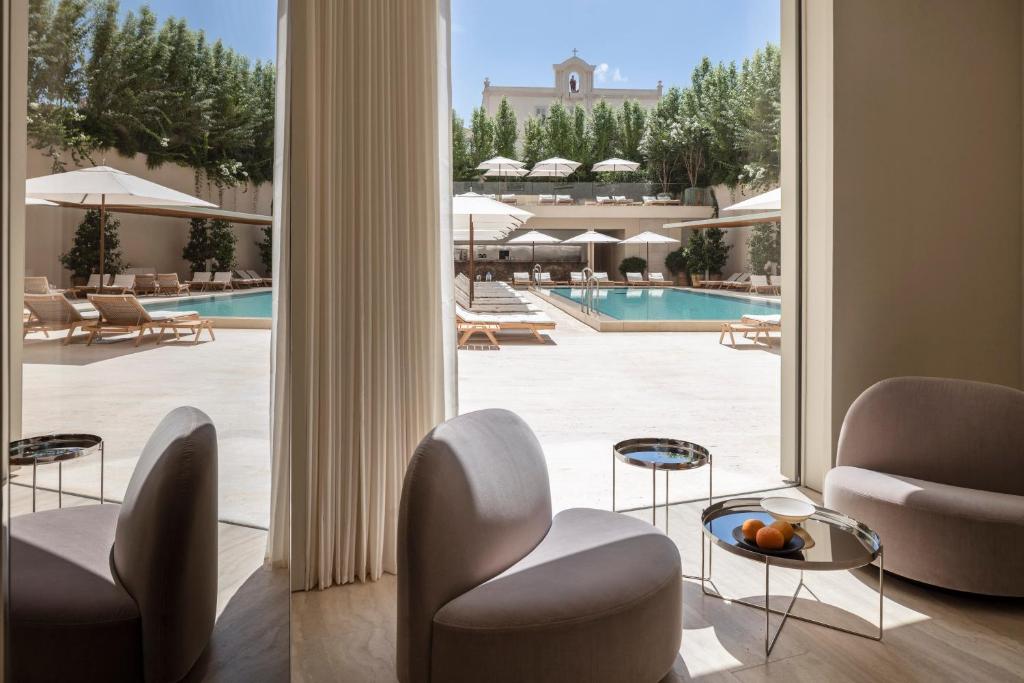
Stay
Margosa Hotel
While Jaffa is more often defined by its ultra-luxe (and ultra-pricey) hotels, a handful of budget-friendly stays line the perimeter of its Old Town. Among the loveliest is the cosy Margosa Hotel, just south of the district’s main sights, which has bright rooms with plenty of space and a breakfast buffet that rivals some of Tel Aviv’s biggest players. Doubles from £122, B&B. margosa-hotel.com
The Jaffa
If you’re up for a splurge, you might as well do it at The Jaffa, a destination-defining hotel smack in the middle of the district. When this high-design hideaway took over the quarter’s 19th-century French Hospital building, the owners called in British designer John Pawson to infuse the space with a modern touch, resulting in a designer chair-studded tearoom in the former chapel and suites with triple-height, timeworn ceilings. Doubles from £552, B&B. marriott.co.uk
Join our commenting forum
Join thought-provoking conversations, follow other Independent readers and see their replies
Comments